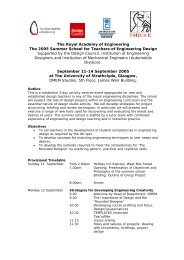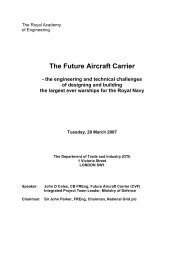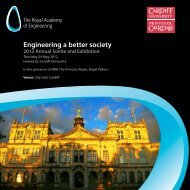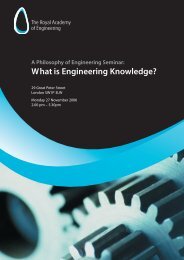Engineering graduates for industry - Royal Academy of Engineering
Engineering graduates for industry - Royal Academy of Engineering
Engineering graduates for industry - Royal Academy of Engineering
You also want an ePaper? Increase the reach of your titles
YUMPU automatically turns print PDFs into web optimized ePapers that Google loves.
company. Students keep a log book <strong>of</strong> their<br />
activities and prepare a dissertation related to<br />
their work. Assessment is made by both the<br />
visiting academic and company staff. With very<br />
few exceptions, DIS placements are salaried<br />
and placement students can expect to earn<br />
somewhere in the range <strong>of</strong> £12.5K to £20K.<br />
Perceived benefits<br />
Staff at Loughborough believe that placement<br />
students return with greater motivation which<br />
in turn leads to improved final year marks.<br />
Placements also appear to aid retention within<br />
the engineering sector. An engineering<br />
placement student is much more likely to<br />
embark upon an engineering and technology<br />
related career than a non-placement student. From the 2006/07 graduate cohort, the first career destination data 6<br />
months after graduating revealed that retention within the sector was over 85% <strong>for</strong> students who had been on a<br />
placement, compared with just over 60% <strong>for</strong> other students. For companies, placements are <strong>of</strong>ten regarded as an<br />
extended assessment process <strong>for</strong> graduate recruitment purposes.<br />
The student’s log book can contribute towards the achievement <strong>of</strong> Chartered Engineer (CEng) status. For Mechanical<br />
and Manufacturing <strong>Engineering</strong>, this recognition happens automatically through the IMechE, whose Pr<strong>of</strong>essional<br />
Development Standards Committee views the DIS scheme as: “an exemplary university thick sandwich course which is<br />
admirably linked to the Monitored Pr<strong>of</strong>essional Development Scheme process.”<br />
Challenges<br />
Despite average uptake <strong>of</strong> 57%, the main challenge faced is to increase DIS enrolments. This problem is exacerbated by<br />
the introduction <strong>of</strong> fees so that some students prefer to finish their degree as quickly as possible and move into a<br />
permanent job. Other deterrents include issues with accommodation and personal relationships.<br />
The departments have no desire to make placements compulsory. Emphasis is always placed on students convincing<br />
the employer to recruit them, so such a move could prove difficult to implement. In addition, students are occasionally<br />
made redundant while on placement although the University will seek alternative opportunities <strong>for</strong> them.<br />
Loughborough’s preference is to convince students <strong>of</strong> the merits <strong>of</strong> the scheme.<br />
Effective practice exemplar 13: the Teaching Contract Scheme at Loughborough<br />
The Teaching Contract Scheme in Mechanical and Manufacturing <strong>Engineering</strong> is an example <strong>of</strong> collaboration with<br />
multiple companies to provide <strong>industry</strong>-based group design projects. Currently, 14 companies and over 200 students<br />
are involved in the scheme, which operates with second and fourth year students who complete projects set by the<br />
collaborating company in cooperation with the University. In the second year module, Application <strong>of</strong> <strong>Engineering</strong> Design:<br />
Industry-Based Project, all Mechanical <strong>Engineering</strong> students complete projects in teams <strong>of</strong> up to four. In the final year <strong>of</strong><br />
both Mechanical and Product Design MEng programmes, students tackle bigger projects and are organised into multidisciplinary<br />
teams. In addition, MEng finalists act as mentors to second year groups.<br />
At the start <strong>of</strong> the scheme, students visit their company and projects are negotiated and defined. Companies tend to<br />
have open-ended problems that need a solution and negotiation is <strong>of</strong>ten required to establish reasonable parameters<br />
<strong>for</strong> the project. Accompanying lecture programmes give structure to the project work. The industrialists visit<br />
Loughborough at specific times during the year <strong>for</strong> progress reports on the projects and to take part in tutorials. The<br />
students submit a final report and give an oral presentation to the company engineers. For final year projects there is<br />
also a major exhibition <strong>of</strong> all the work to which the companies and external examiners are invited.<br />
The scheme is directed by one member <strong>of</strong> academic staff, with the part-time support <strong>of</strong> one member <strong>of</strong> administrative<br />
staff. They receive the full backing <strong>of</strong> the Head <strong>of</strong> School. The companies pay a small fee to the University which funds<br />
the necessary industrial visits, hospitality, basic project costs and maintains a high report presentation standard.<br />
36 The <strong>Royal</strong> <strong>Academy</strong> <strong>of</strong> <strong>Engineering</strong>

















